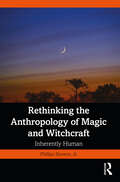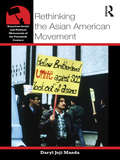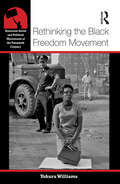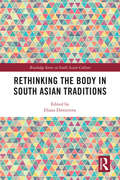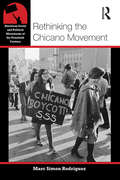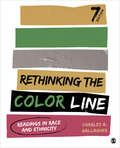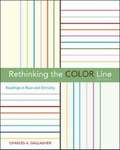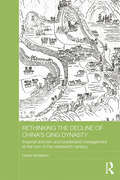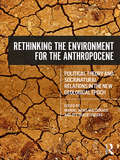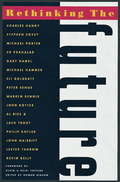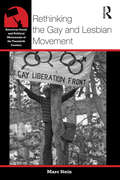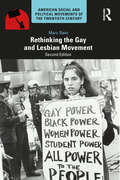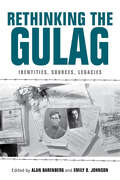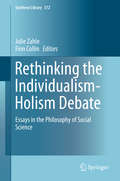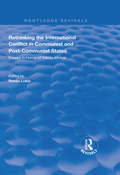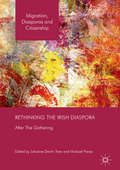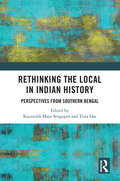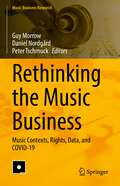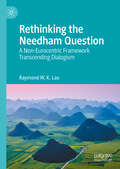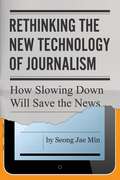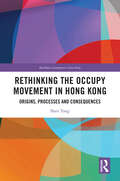- Table View
- List View
Rethinking the Anthropology of Magic and Witchcraft: Inherently Human
by Phillips Stevens, Jr.This book introduces students to the anthropology of magic and witchcraft, terms widely used but without widely accepted definitions. It takes a new approach to this area within the anthropology of religion, demonstrating that the bases for these beliefs and alleged practices are inherent in human cognition and psychology, even instinctual, and likely rooted in our evolutionary biology. It shows how magic and magical thinking are regular elements in people’s daily lives, and that understanding the components of the witchcraft complex offers surprisingly important insights into patterns of thinking and social behavior. The book reviews the many meanings of “magic” and “witchcraft,” and introduces the best anthropological meanings of the terms. The components of these beliefs are timeless and universal; this fact, and recent advances in the brain sciences, suggest that the principles of magic are derived from basic processes of human thinking, and the attributes of the witch derive from neurobiologically based fears and fantasies. The propensity for such beliefs probably had adaptive significance in the evolutionary development of the human species; they are inherently human. This book is intended to focus anew on the core concepts of magic, witchcraft, and the supernatural, while also serving as an introduction to the anthropology of religion for undergraduate and graduate-level courses.
Rethinking the Asian American Movement (American Social and Political Movements of the 20th Century)
by Daryl Joji MaedaAlthough it is one of the least-known social movements of the 1960s and 1970s, the Asian American movement drew upon some of the most powerful currents of the era, and had a wide-ranging impact on the political landscape of Asian America, and more generally, the United States. Using the racial discourse of the black power and other movements, as well as antiwar activist and the global decolonization movements, the Asian American movement succeeded in creating a multi-ethnic alliance of Asians in the United States and gave them a voice in their own destinies. Rethinking the Asian American Movement provides a short, accessible overview of this important social and political movement, highlighting key events and key figures, the movement's strengths and weaknesses, how it intersected with other social and political movements of the time, and its lasting effect on the country. It is perfect for anyone wanting to obtain an introduction to the Asian American movement of the twentieth century.
Rethinking the Black Freedom Movement (American Social and Political Movements of the 20th Century)
by Yohuru WilliamsThe African American struggle for civil rights in the twentieth century is one of the most important stories in American history. With all the information available, however, it is easy for even the most enthusiastic reader to be overwhelmed. In Rethinking the Black Freedom Movement, Yohuru Williams has synthesized the complex history of this period into a clear and compelling narrative. Considering both the Civil Rights and Black Power movements as distinct but overlapping elements of the Black Freedom struggle, Williams looks at the impact of the struggle for Black civil rights on housing, transportation, education, labor, voting rights, culture, and more, and places the activism of the 1950s and 60s within the context of a much longer tradition reaching from Reconstruction to the present day. Exploring the different strands within the movement, key figures and leaders, and its ongoing legacy, Rethinking the Black Freedom Movement is the perfect introduction for anyone seeking to understand the struggle for Black civil rights in America.
Rethinking the Body in South Asian Traditions (Routledge Series on South Asian Culture)
by Diana DimitrovaThis book analyses cultural questions related to representations of the body in South Asian traditions, human perceptions and attitudes toward the body in religious and cultural contexts, as well as the processes of interpreting notions of the body in religious and literary texts. Utilising an interdisciplinary perspective by means of textual study and ideological analysis, anthropological analysis, and phenomenological analysis, the book explores both insider- and outsider perspectives and issues related to the body from the 2nd century CE up to the present-day. Chapters assess various aspects of the body including processes of embodiment and questions of mythologizing the divine body and othering the human body, as revealed in the literatures and cultures of South Asia. The book analyses notions of mythologizing and "othering" of the body as a powerful ideological discourse, which empowers or marginalizes at all levels of the human condition. Offering a deep insight into the study of religion and issues of the body in South Asian literature, religion and culture, this book will be of interest to academics in the fields of South Asian studies, South Asian religions, South Asian literatures, cultural studies, philosophy and comparative literature.
Rethinking the Chicano Movement (American Social and Political Movements of the 20th Century)
by Marc Simon RodriguezIn the 1960s and 1970s, an energetic new social movement emerged among Mexican Americans. Fighting for civil rights and celebrating a distinct ethnic identity, the Chicano Movement had a lasting impact on the United States, from desegregation to bilingual education. Rethinking the Chicano Movement provides an astute and accessible introduction to this vital grassroots movement. Bringing together different fields of research, this comprehensive yet concise narrative considers the Chicano Movement as a national, not just regional, phenomenon, and places it alongside the other important social movements of the era. Rodriguez details the many different facets of the Chicano movement, including college campuses, third-party politics, media, and art, and traces the development and impact of one of the most important post-WWII social movements in the United States.
Rethinking the Cinematic Cold War: The Struggle for Hearts and Minds Goes Global (Visual and Media Cultures of the Cold War and Beyond)
by Maurizio Zinni Stefano Pisu, Francesco PitassioHistorical consensus increasingly views the Cold War period as a multifaceted conflict which extended beyond the borders of the USSR and USA, encompassing both cultural and diplomatic history. Debate remains, however, about how best to balance the Cold War as a cultural event with the existence of Cold War culture. Rethinking the Cinematic Cold War provides a fresh reassessment of this period, highlighting how the convergence of geopolitical interests, cultural production and exchange, and technological and media history shaped a unique epoch. Consequently, this volume seeks to diagnose the role cinema played in expanding the ideological outlook of artists, audiences, and policymakers.
Rethinking the Color Line: Readings in Race and Ethnicity
by Charles A. GallagherRethinking the Color Line helps make sense of how race and ethnicity influence aspects of social life in ways that are often made invisible by culture, politics, and economics. Charles A. Gallagher has assembled a collection of readings that are theoretically informed and empirically grounded to explain the dynamics of race and ethnicity in the United States. Students will be equipped to confidently navigate the issues of race and ethnicity, examine its contradictions, and gain a comprehensive understanding of how race and ethnic relations are embedded in the institutions that structure their lives. User-friendly without sacrificing intellectual or theoretical rigor, the Seventh Edition has been thoroughly updated to reflect the current debates and the state of contemporary U.S race relations.
Rethinking the Color Line: Readings in Race and Ethnicity
by Charles A. GallagherRethinking the Color Line helps make sense of how race and ethnicity influence aspects of social life in ways that are often made invisible by culture, politics, and economics. Charles A. Gallagher has assembled a collection of readings that are theoretically informed and empirically grounded to explain the dynamics of race and ethnicity in the United States. Students will be equipped to confidently navigate the issues of race and ethnicity, examine its contradictions, and gain a comprehensive understanding of how race and ethnic relations are embedded in the institutions that structure their lives. User-friendly without sacrificing intellectual or theoretical rigor, the Seventh Edition has been thoroughly updated to reflect the current debates and the state of contemporary U.S race relations.
Rethinking the Color Line: Readings in Race and Ethnicity (3rd Edition)
by Charles A. GallagherThis anthology of current research and writings examines contemporary issues and explores new approaches to the study of race and ethnic relations.
Rethinking the Decline of China's Qing Dynasty: Imperial Activism and Borderland Management at the Turn of the Nineteenth Century (Asian States and Empires)
by Daniel McMahonThe many instances of regional insurgency and unrest that erupted on China’s borderlands at the turn of the nineteenth century are often regarded by scholars as evidence of government disability and the incipient decline of the imperial Qing dynasty. This book, based on extensive original research, argues that, on the contrary, the response of the imperial government went well beyond pacification and reconstruction, and demonstrates that the imperial political culture was dynamic, innovative and capable of confronting contemporary challenges. The author highlights in particular the Jiaqing Reforms of 1799, which enabled national reformist ideology, activist-oriented administrative education, the development of specialised frontier officials, comprehensive borderland rehabilitation, and the sharing of borderland administration best practice between different regions. Overall, the book shows that the Qing regime had sustained vigour, albeit in difficult and changing circumstances.
Rethinking the Environment for the Anthropocene: Political Theory and Socionatural Relations in the New Geological Epoch
by Manuel Arias-Maldonado Zev TrachtenbergThis book brings together the most current thinking about the Anthropocene in the field of Environmental Political Theory ('EPT'). It displays the distinctive contribution EPT makes to the task of thinking through what 'the environment' means in this time of pervasive human influence over natural systems. Across its chapters the book helps develop the idea of 'socionatural relations'—an idea that frames the environment in the Anthropocene in terms of the interconnected relationship between human beings and their surroundings. Coming from both well-established and newer voices in the field, the chapters in the book show the diversity of points of view theorists take toward the Anthropocene idea, and socionatural relations more generally. However, all the chapters exemplify a characteristic of work in EPT: the self-conscious effort to provide normative interpretations that are responsive to scientific accounts. The Introduction explains the complicated interaction between science and EPT, showing how it positions EPT to consider the Anthropocene. And the Afterword, by a pioneer in the field, relates all the chapters to a perspective that has been deeply influential in EPT. This book will be of interest to scholars already engaged in EPT. But it will also serve as an introduction to the field for students of Political Theory, Philosophy, Environmental Studies, and related disciplines, who will learn about the EPT approach from the Introduction, and then see it applied to the pressing question of the Anthropocene in the ensuing chapters. The book will also help readers interested in the Anthropocene from any disciplinary perspective develop a critical understanding of its political meanings.
Rethinking the Future
by Rowan Gibson Michael Porter Stephen Covey C K Prahalad Charles HandyThe world's foremost business thinkers look at how organizations can be redesigned to survive and thrive in tomorrow's hypercompetitive global environment, giving readers a framework for understanding the big picture. Essential reading for anyone concerned with business success beyond the next quarter, Rethinking the Future gives a panoramic perspective in an accessible context.
Rethinking the Gay and Lesbian Movement (American Social and Political Movements of the 20th Century)
by Marc SteinRethinking the Gay and Lesbian Movement provides a new narrative history of U.S. gay and lesbian activism, drawing on primary research in the field and the best scholarship on the history of the gay and lesbian movement. Focusing on four decades of social, cultural, and political change in the second half of the twentieth century, Stein examines the changing agendas, beliefs, strategies, and vocabularies of a movement that encompassed diverse actions, campaigns, ideologies, and organizations. From the homophile activism of the 1950s and 1960s, through the rise of gay liberation and lesbian feminism in the 1970s, to the multicultural and AIDS activist movements of the 1980s, Rethinking the Gay and Lesbian Movement provides a strong foundation for understanding gay, lesbian, bisexual, transgender, and queer politics today. Rethinking the Gay and Lesbian Movement provides a short, accessible overview of an important and transformational struggle for social change, highlighting key individuals and events, influential groups and networks, strong alliances and coalitions, difficult challenges and obstacles, major successes and failures, and the movement’s lasting effects on the country. This volume will be valued by everyone interested in gay and lesbian history, the history of social movements, and the history of the United States.
Rethinking the Gay and Lesbian Movement (American Social and Political Movements of the 20th Century)
by Marc SteinNow in its second edition, Rethinking the Gay and Lesbian Movement provides an accessible overview of an important and transformational struggle for social change, highlighting key individuals and events, influential groups and organizations, major successes and failures, and the movement’s lasting effects and unfinished work. Focusing on four decades of social, cultural, and political change in the second half of the twentieth century, Marc Stein examines the changing agendas, beliefs, strategies, and vocabularies of a movement that encompassed diverse actions, campaigns, ideologies, and organizations. From the homophile activism of the 1950s and 1960s through the rise of gay liberation and lesbian feminism in the 1970s to the multicultural and AIDS activist movements of the 1980s, this book provides a strong foundation for understanding gay, lesbian, bisexual, transgender, and queer politics today. This new edition reflects the substantial changes in the field since the book’s original publication eleven years ago. Rethinking the Gay and Lesbian Movement will be valued by everyone interested in LGBTQ struggles, the politics of movement activism, and the history of social justice in the United States.
Rethinking the Gulag: Identities, Sources, Legacies
by Alexander Etkind Lynne Viola Jeffrey S. Hardy Josephine Von Zitzewitz Judith Pallot Irina Anatolievna Flige Susan Grunewald Mikhail Nakonechnyi Gavin Slade Sarah J. YoungThe Soviet Gulag was one of the largest, most complex, and deadliest systems of incarceration in the 20th century. What lessons can we learn from its network of labor camps and prisons and exile settlements, which stretched across vast geographic expanses, included varied institutions, and brought together inmates from all the Soviet Union's ethnicities, professions, and social classes?Drawing on a massive body of documentary evidence, Rethinking the Gulag: Identities, Sources, Legacies explores the Soviet penal system from various disciplinary perspectives. Divided into three sections, the collection first considers "identities"—the lived experiences of contingents of detainees who have rarely figured in Gulag histories to date, such as common criminals and clerics. The second section surveys "sources" to explore the ways new research methods can revolutionize our understanding of the system. The third section studies "legacies" to reveal the aftermath of the Gulag, including the folk beliefs and traditions it has inspired and the museums built to memorialize it. While all the chapters respond to one another, each section also concludes with a reaction by a leading researcher: geographer Judith Pallot, historian Lynne Viola, and cultural historian and literary scholar Alexander Etkind.Moving away from grand metaphorical or theoretical models, Rethinking the Gulag instead unearths the complexities and nuances of experience that represent a primary focus in the new wave of Gulag studies.
Rethinking the Individualism-Holism Debate: Essays in the Philosophy of Social Science (Synthese Library #372)
by Finn Collin Julie ZahleThis collection of papers investigates the most recent debates about individualism and holism in the philosophy of social science. The debates revolve mainly around two issues: firstly, whether social phenomena exist sui generis and how they relate to individuals. This is the focus of discussions between ontological individualists and ontological holists. Secondly, to what extent social scientific explanations may and should, focus on individuals and social phenomena respectively. This issue is debated amongst methodological holists and methodological individualists.In social science and philosophy, both issues have been intensively discussed and new versions of the dispute have appeared just as new arguments have been advanced. At present, the individualism/holism debate is extremely lively and this book reflects the major positions and perspectives within the debate. This volume is also relevant to debates about two closely related issues in social science: the micro-macro debate and the agency-structure debate.This book presents contributions from key figures in both social science and philosophy, in the first such collection on this topic to be published since the 1970s.
Rethinking the International Conflict in Communist and Post-communist States: Essays in Honour of Miklos Molnar (Routledge Revivals)
by Renéo LukicFirst published in 1998, the essays in this book cover a wide range of subjects related to Soviet/Russian politics and to political developments in Southeastern Europe since 1989. The first three chapters focus on Soviet/Russian foreign and domestic policy before and after the end of the Cold War. The next three chapters concentrate on the disintegration of Yugoslavia and its aftermath. The final chapter covers political developments in the Federal Republic of Yugoslavia up to the present day. The contributors to this book were all former students of Professor Miklós Molnár, and they are all now prominent researchers in the field of international relations.
Rethinking the Irish Diaspora: After The Gathering (Migration, Diasporas and Citizenship)
by Michael Pierse Johanne Devlin TrewThis book provides scholarly perspectives on a range of timely concerns in Irish diaspora studies. It offers a focal point for fresh interchanges and theoretical insights on questions of identity, Irishness, historiography and the academy’s role in all of these. In doing so, it chimes with the significant public debates on Irish and Irish emigrant identities that have emerged from Ireland’s The Gathering initiative (2013) and that continue to reverberate throughout the Decade of Centenaries (2012-2023) in Ireland, North and South. In ten chapters of new research on key areas of concern in this field, the book sustains a conversation centred on three core questions: what is diaspora in the Irish context and who does it include/exclude? What is the view of Ireland and Northern Ireland from the diaspora? How can new perspectives in the academy engage with a more rigorous and probing theorisation of these concerns? This thought-provoking work will appeal to students and scholars of history, geography, literature, sociology, tourism studies and Irish studies.
Rethinking the Judicial Settlement of Reconstruction
by Pamela BrandweinAmerican constitutional lawyers and legal historians routinely assert that the Supreme Court's state action doctrine halted Reconstruction in its tracks. But it didn't. Rethinking the Judicial Settlement of Reconstruction demolishes the conventional wisdom - and puts a constructive alternative in its place. Pamela Brandwein unveils a lost jurisprudence of rights that provided expansive possibilities for protecting blacks' physical safety and electoral participation, even as it left public accommodation rights undefended. She shows that the Supreme Court supported a Republican coalition and left open ample room for executive and legislative action. Blacks were abandoned, but by the president and Congress, not the Court. Brandwein unites close legal reading of judicial opinions (some hitherto unknown), sustained historical work, the study of political institutions, and the sociology of knowledge. This book explodes tired old debates and will provoke new ones.
Rethinking the Local in Indian History: Perspectives from Southern Bengal
by Kaustubh Mani Sengupta and Tista DasThis volume looks at the concept of the ‘local’ in Indian history. Through a case study of Bengal, it studies how worldwide currents—be it colonial governance, pedagogic practices or intellectual rhythms—simultaneously inform and interact with particular local idioms to produce variegated histories of a region. It examines the processes through which the idea of the ‘local’ gets constituted in different spatial entities such as the frontier province of the Jangal Mahal, the Sundarbans, the dry terrain of Birbhum-Bankura-Purulia and the urban spaces of Calcutta and other small towns. The volume further discusses the various administrative as well as amateur representations of these settings to chart out the ways through which certain spaces get associated with a particular image or history. The chapters in the volume explore a variety of themes—textual representations of the region, epistemic practices and educational policies, as well as administrative manoeuvres and governmental practices which helped the state in mapping its people. An important contribution in the study of Indian history, this interdisciplinary work will be of great interest to scholars and researchers of science and technology studies, history, sociology and social anthropology and South Asian studies.
Rethinking the Music Business: Music Contexts, Rights, Data, and COVID-19 (Music Business Research)
by Peter Tschmuck Guy Morrow Daniel NordgårdCOVID-19 had a global impact on health, communities, and the economy. As a result of COVID-19, music festivals, gigs, and events were canceled or postponed across the world. This directly affected the incomes and practices of many artists and the revenue for many entities in the music business. Despite this crisis, however, there are pre-existing trends in the music business – the rise of the streaming economy, technological change (virtual and augmented reality, blockchain, etc.), and new copyright legislation. Some of these trends were impacted by the COVID-19 crisis while others were not. This book addresses these challenges and trends by following a two-pronged approach: the first part focuses on the impact of COVID-19 on the music business, and the second features general perspectives. Throughout both parts, case studies bring various themes to life. The contributors address issues within the music business before and during COVID-19. Using various critical approaches for studying the music business, this research-based book addresses key questions concerning music contexts, rights, data, and COVID-19. Rethinking the music business is a valuable study aid for undergraduate and postgraduate students in subjects including the music business, cultural economics, cultural management, creative and cultural industries studies, business and management studies, and media and communications.
Rethinking the Needham Question: A Non-Eurocentric Framework Transcending Dialogism
by Raymond W. LauThis book offers a new investigation of the Needham Question. Why did modern science emerge in Europe, but not in any of the advanced non-European civilizations? Eurocentric accounts attribute it to certain ‘qualities’ said to be ‘unique’ to Europe. Opposed to the Eurocentric view is a position known as the ‘dialogical perspective’. Dialogism argues that Europe borrowed heavily from non-European scientific knowledges, and that scientific exchanges were key to the development of modern science. Neo-Eurocentric arguments have emerged in response to the challenge of dialogism, and the debate between Eurocentrism/neo-Eurocentrism and dialogism currently stands at a stalemate. In this book, Raymond Lau brings a new theoretical-methodological framework to finally settle this debate. The historical analysis developed here shows that to secure the non-Eurocentric case, and decisively rebut Eurocentrism and neo-Eurocentrism, it is necessary to go beyond dialogism both theoretically and methodologically.
Rethinking the New Technology of Journalism: How Slowing Down Will Save the News
by Seong Jae MinNews organizations have always sought to deliver information faster and to larger audiences. But when clicks drive journalism, the result is often simplistic, sensational, and error-ridden reporting. In this book, Seong Jae Min argues in favor of "slow journalism," a growing movement that aims to produce more considered, deliberate reporting that better serves the interests of democracy.Min explores the role of technology in journalism from the printing press to artificial intelligence, documenting the hype and hope associated with each new breakthrough as well as the sometimes disappointing—and even damaging—unintended consequences. His analysis cuts through the discussion of clickbait headlines and social-media clout chasing to identify technological bells and whistles as the core problem with journalism today. At its heart, Min maintains, traditional shoe-leather reporting—knocking on doors, talking to people, careful observation and analysis—is still the best way for journalism to serve its civic purpose. Thoughtful and engaging, Rethinking the New Technology of Journalism is a compelling call for news gathering to return to its roots. Reporters, those studying and teaching journalism, and avid consumers of the media will be interested in this book.
Rethinking the New Technology of Journalism: How Slowing Down Will Save the News
by Seong Jae MinNews organizations have always sought to deliver information faster and to larger audiences. But when clicks drive journalism, the result is often simplistic, sensational, and error-ridden reporting. In this book, Seong Jae Min argues in favor of “slow journalism,” a growing movement that aims to produce more considered, deliberate reporting that better serves the interests of democracy.Min explores the role of technology in journalism from the printing press to artificial intelligence, documenting the hype and hope associated with each new breakthrough as well as the sometimes disappointing—and even damaging—unintended consequences. His analysis cuts through the discussion of clickbait headlines and social-media clout chasing to identify technological bells and whistles as the core problem with journalism today. At its heart, Min maintains, traditional shoe-leather reporting—knocking on doors, talking to people, careful observation and analysis—is still the best way for journalism to serve its civic purpose. Thoughtful and engaging, Rethinking the New Technology of Journalism is a compelling call for news gathering to return to its roots. Reporters, those studying and teaching journalism, and avid consumers of the media will be interested in this book.
Rethinking the Occupy Movement in Hong Kong: Origins, Processes and Consequences (ISSN)
by Shen YangYang examines the political process of the Occupy Movement spanning from January 2013, when the “Occupy Central with Love and Peace” (OCLP) campaign was initiated, to December 2014, when the Occupy Movement finally ended. This book adopts an actor-centered approach in the study of democratization and places civil society as the focus of the analysis. The OCLP campaign was an attempt to transfer leadership of democratization from political parties to civil society, while the incorporation of Deliberation Days further let ordinary participants decide on the electoral proposals. The democratic ideals of civil society activists and the mobilization of radical democrats led the campaign to enter a radical position. The Chinese government interpreted democratization in Hong Kong from a regime security perspective and took a hardliner position. After the Occupy Movement finally occurred, the leadership of civil society and the conception of civil disobedience contained the radical protesters. However, after the movement, civil society organizations were blamed for its failure, and contention in Hong Kong became more transgressive and decentralized. This book is a valuable resource for scholars of Hong Kong’s Politics and a relevant case study for those studying the dynamics of social movements and the civil society strategy in democratic transition.
